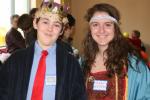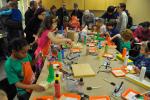Noah Tamarkin, anthropology and science & technology studies, will join a roundtable to discuss his recently published book, "Genetic Afterlives: Black Jewish Indigeneity in South Africa" (Duke University Press, 2020).
In 1997, M. E. R. Mathivha, an elder of the black Jewish Lemba people of South Africa, announced to the Lemba Cultural Association that a recent DNA study substantiated their ancestral connections to Jews. Lemba people subsequently leveraged their genetic test results to seek recognition from the post-apartheid government as indigenous Africans with rights to traditional leadership and land, retheorizing genetic ancestry in the process.
In Genetic Afterlives, Noah Tamarkin illustrates how Lemba people give their own meanings to the results of DNA tests and employ them to manage competing claims of Jewish ethnic and religious identity, African indigeneity, and South African citizenship. Tamarkin turns away from genetics researchers' results that defined a single story of Lemba peoples' “true” origins and toward Lemba understandings of their own genealogy as multivalent. Guided by Lemba people’s negotiations of their belonging as diasporic Jews, South African citizens, and indigenous Africans, Tamarkin considers new ways to think about belonging that can acknowledge the importance of historical and sacred ties to land without valorizing autochthony, borders, or other technologies of exclusion. Sponsored by Cornell Jewish Studies and the Department's of Anthropology and Science & Technology Studies with generous support by the Africana Studies & Research Center, and the Mario Einaudi Center for International Studies as part of the Reimagining Citizenship seminar series. Hosted by eCornell. More information at jewishstudies.com
Register through eCornell at https://www.ecornell.com/keynotes/overview/K022621/.





